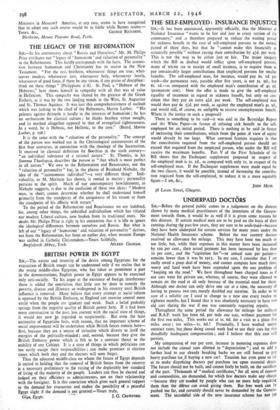Stn,—It has been announced, apparently officially, that the Minister of
National Insurance " wants to be fair and just to every section of the community," and Is therefore prepared to reduce the waiting period for sickness benefit in the case of self-employed persons to the normal period of three days, but that he " cannot make this financially or actuarially possible " without raising their contribution by aid. per week. This is not the way to be either just or fair. The major inequity which the. Bill as drafted would inflict upon self-employed persons, many of whom are in receipt of small incomes, is to require them to pay considerably larger contributions than emplo7ed persons for smaller benefits. The self-employed man, for instance, would pay 6s. id. per week—the permanent rate, payable after five years, is not 5s. 9d., but 6s. id.—as compared with the employed man's contribution of 4s. 9d. (permanent rate); Now the offer is made to give the self-employed equality of treatment in regard to sickness benefit, but only on con- dition that they pay an extra 4id. per week. The self-employed man would then pay 6s. 51d. per week, as against the employed man's 4s. 9d, and would still, of course, be ineligible to receive unemployment benefit. Where is the justice in such a proposal?
There is something to be said—it was said in the Beveridge Report and the White Paper—in favour of refusing sick benefit to the self- employed for an initial period. There is nothing to be said in favour of increasing their_ contributions, which from tile point of view of equity would already be too large. What common fairness requires is that the contribution required from the self-employed person should not exceed that required from the employed person, who under the Bill will receive the maximum benefits. Part V of the First Schedule of the Bill shows that the Exchequer supplement proposed in respect of the employed man is 2s. id., as compared with only is. in respect of the self-employed man. If the Exchequer supplement were made equal for the two classes, it would be possible, instead of increasing the contribu- tion required from the self-employed, to reduce, it to a more equitable figure.—I am, &c., 38 Leven Street, Glasgow.
JOHN MUIR.






























 Previous page
Previous page